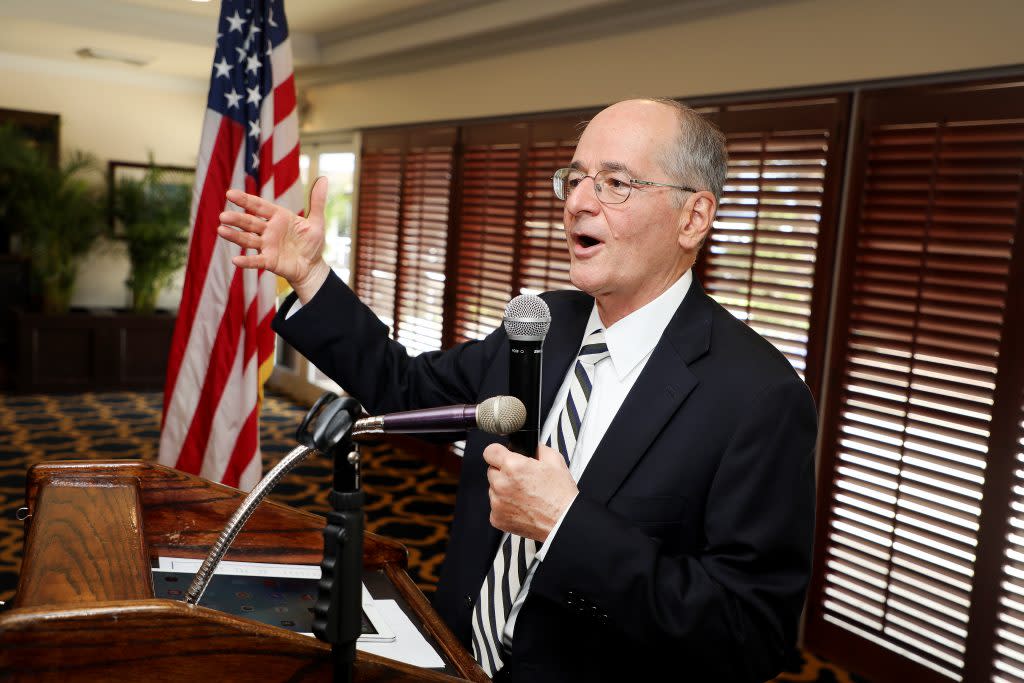Florida's Chief Justice Addresses Incivility in the Legal Profession

3/13/19- Fort Lauderdale- Florida Supreme Court Chief Justice Charles T. Canady speaks at The Stephen R. Booher American Inn of Court luncheon, titled Maintaining an Island of Civility: Professionalism in a Time of Incivility, at the Lauderdale Yacht Club. J. Albert Diaz/ALM
You don’t have to look far to find incivility in contemporary American life. Some attribute the United States’ not-so subtle tumult to recent events in our political realm. Others would contend we’ve always been this way.
Charles T. Canady, the chief justice of the Florida Supreme Court, said there’s a precedent for coarseness in our country’s dialogue.
“I think sometimes we can exaggerate how much civility has declined,” Canady said. “I think we need to remember that in our public life historically, bitter invective has always ... or has frequently been a part of public debate.”
On Wednesday, Canady spoke with the Daily Business Review before addressing members of Florida’s legal community to share his thoughts on the state of courteousness in the legal field. The talk, “Maintaining an Island of Civility: Professionalism in a Time of Incivility,” was hosted by the Stephen R. Booher Inn of Court at the Lauderdale Yacht Club.
His comments echoed a survey by the Daily Business Review that showed 91 percent of respondents felt civility — or rather a lack of it — had become a problem in the legal profession. The establishment of professionalism committees in Florida over the last decade attests to mounting concerns.
Speaking before an audience that included Broward Circuit Chief Judge Jack Tuter and Tripp Scott lawyer Charles Tatelbaum, Canady quipped that chairing such committees is often a “thankless” job. The chief justice also emphasized the need for humility in not just the courtroom, but in day-to-day interactions.
“It’s easy to be civil to others who are themselves civil,” he said. “When uncivil behavior does require a response, the response can be carried out in a manner that is civil.”
Before his presentation, Canady defined civility as the ability “to rise above personality and focus on the issues.”

Fort Lauderdale- Florida Supreme Court Justice Charles T. Canady receives applause as he walks to present. Photo: J. Albert Diaz/ALM
“If we fail to do that, then personal disputes get in the way of doing the business at hand,” he said. “It's very important for the dignity of the profession and the success of the profession — and for our service to the people we serve, our clients — that we maintain a high standard of civility.”
Canady noted the pervasiveness of irritability has sometimes resulted in attorneys acting out at the behest of those they’re representing.
“Sometimes clients actually push lawyers to do things that are not civil, so that's another part of the equation,” he said. “In those circumstances I think that the lawyer has a responsibility to educate the client and help the client understand that that kind of behavior is really going to be counterproductive.”
The chief justice believes the pursuit of maintaining respect in an occupation defined by disagreements will be ongoing, regardless of the political and social climate it’s taking place in.
“It's going to be a never-ending thing. There is no magic solution to the problems of incivility,” he said. Besides the short-term remedies offered through disciplinary measures, Canady called for attorneys to extend conversations about mutual respect beyond their usual social circles. In his mind, this means both within the legal profession and beyond it.
“I think sometimes people who are involved in … bar activities in general are going to be people who are sensitive to the demands of professionalism,” he said. “Whereas people who are not, many of them will also be sensitive to that … but some won't be. And so it's a question of how you get the message across to people who might not be in their local bar associations to hear what's being said.”
Following his speech, Canady was asked how this message of decency and consideration could be best spread.
“The most effective way you can preach to the choir… is by the way you conduct yourself,” he said, admitting that in these times of self-made communal bubbles, it’s hard to reach those who don’t want to be reached.
“That’s a challenge,” he said. “I hope they can hear it.”
Related stories:
Charles Canady Sworn In as Florida Supreme Court Chief Justice
Civility in Mediation: What's the Big Deal?
Survey Says: Watch Out for Attorneys With Their Lies, Expletives and Nasty Email



